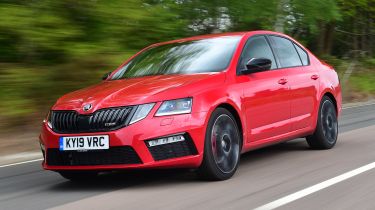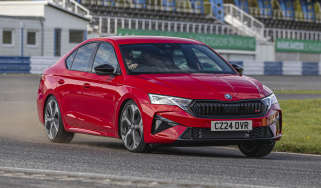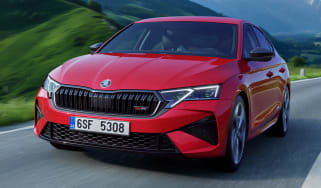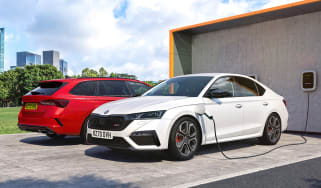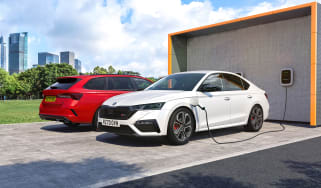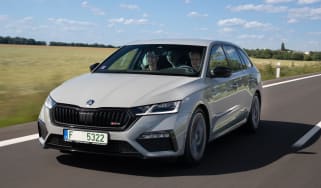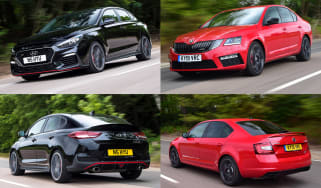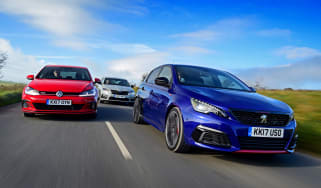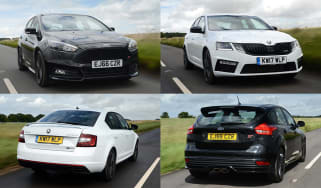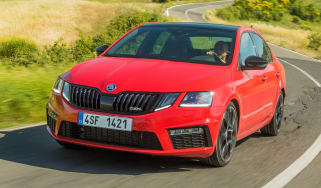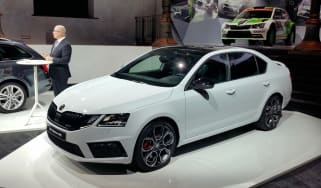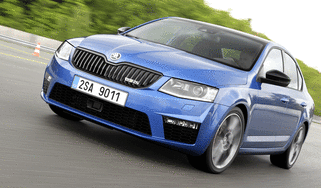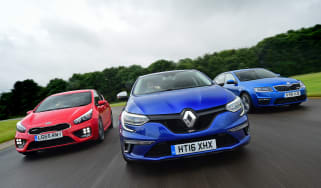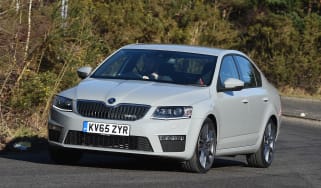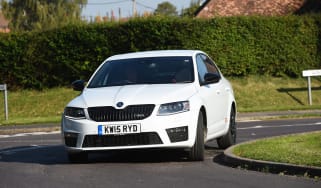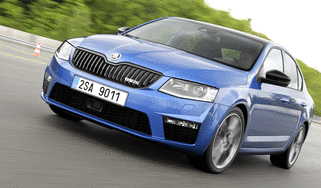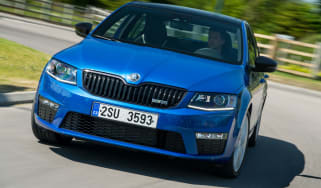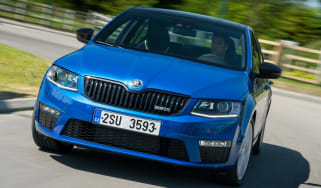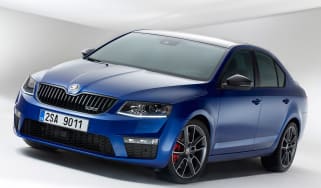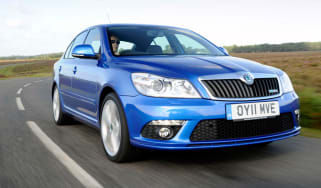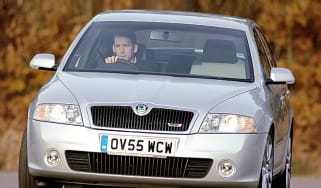Skoda Octavia vRS review
The Skoda Octavia vRS is a hot hatch with a difference, as it delivers more practicality than any of its rivals

The Skoda Octavia vRS is a hard car to get excited about, but that's precisely where its appeal lies. While other hot hatches and fast estates are more engaging or characterful, the vRS offers composed pace while remaining practical, solid and good value. Its sober styling inside and out means the vRS won't draw attention like a SEAT Leon Cupra would, and this understated look is part of its appeal.
It's also one of the roomiest in its class, while the Golf GTI-sourced petrol is punchy, efficient and smooth. It's a shame the diesel is a bit too straight-laced, but the vRS 245 petrol gives a little bit more driver appeal thanks to its 242bhp engine and a limited-slip differential. It's not only the most potent Skoda Octavia ever, but also the most exciting to drive. True, it’s a lot of money for a Skoda, but it’s also an awful lot of car.
The latest vRS 245 Challenge version adds an extra veneer of sporty appeal, but the standard car is perfectly capable even without that car’s standard dynamic chassis control (DCC) system and cosmetic tweaks.
The hot hatchback has become a staple of the performance car market, and one of the most practical examples on sale is the Skoda Octavia vRS. Now in its third generation, the Octavia vRS offers performance that's similar to the closely related VW Golf GTI.
Used - available now

2025 Land Rover
Range Rover Sport
20,884 milesAutomaticDiesel3.0L
Cash £77,350
2023 Tesla
Model 3
46,292 milesAutomaticElectric
Cash £18,616
2017 Fiat
500
20,824 milesManualPetrol1.2L
Cash £7,037
2023 Audi
Q3
16,164 milesAutomaticPetrol1.5L
Cash £26,900The thing that marks the rapid vRS out from its rivals is the same thing that marks out the standard Octavia hatchback and estate – a spacious body that offers great practicality. That means the vRS isn't quite as focused as some other hot hatchbacks on sale, but constant development has seen power increase and extra kit added to help deliver a sharper, more focused drive, and it's more than adequate for family car drivers who want a car that can put a smile on their face even when the car's fully laden.
The Skoda Octavia vRS is offered as a five-door hatchback or estate with a choice of petrol or diesel power, manual or dual-clutch automatic gearboxes and front or four-wheel drive, with the latter reserved for diesel models only. There are no manual diesel models. As a result, the vRS range offers a breadth of options for buyers. The Octavia used to be a value proposition, but now its prices have increased and fallen in line with the hot-hatch mainstream – prices start at around £27,500 and climb to almost £30,000.
The mainstay of the range is the vRS hatchback. This has been uprated over the years and now comes with a 2.0 TSI 245PS turbocharged petrol engine. That's the same power output as the Golf GTI Performance; the Skoda is front-wheel drive just like the Golf, but a manual gearbox as standard. A seven-speed DSG auto (standard on the Golf) is available at extra cost.
The Octavia vRS is also available with a 2.0 TDI 184PS diesel, which is the same unit that was previously found in the now discontinued VW Golf GTD. Again, it has a six-speed manual as standard, while the seven-speed DSG is also offered as an option. The vRS TDI with DSG box can be had with four-wheel drive too; it which uses a Haldex-based system to get power to all four wheels. The Octavia vRS Estate is offered in all of these variants.
Skoda Octavia vRS alternatives
Rivals for the Octavia vRS include the already-mentioned VW Golf GTI, plus other front-wheel-drive hot hatchbacks and estates (where offered) such as the Hyundai i30 N, Honda Civic Type R, Peugeot 308 GTI, Ford Focus ST and SEAT Leon Cupra. Skoda gave the Octavia range a facelift in 2017, adding a new nose and extra kit inside, vRS included.
Those after the ultimate Octavia vRS should investigate the Challenge model. With grippy, comfortable Alcantara seats, adaptive dampers, 19-inch alloy wheels and some subtle black exterior tweaks, it’s more of a special edition car than a standalone model. But the options Skoda bundles with if offer a £2,430 saving over a similarly equipped Octavia vRS, and it makes the most of the car’s under-the-radar appeal.
Engines, performance and drive
Despite having a 54mm longer wheelbase than the closely related VW Golf GTI, the Octavia shares the same MQB chassis as its VW Group cousin, highlighting the platform’s flexibility. Many other components are also carried across to the Skoda, including the 242bhp 2.0-litre turbocharged engine, the optional seven-speed dual-clutch transmission and the limited-slip differential.
As a result the Skoda offers a similar level of performance to the Golf on paper, although in reality there are subtle differences. The suspension set-up is the same as the VW’s, with MacPherson struts at the front and, as on more powerful versions of the Octavia such as this one, a multi-link set-up at the rear. Passive dampers are also standard, but as with the Volkswagen, the optional Dynamic Chassis Control adaptive dampers are a worthwhile option to add.
The extra length in the Octavia’s wheelbase compared with the Golf GTI and the fast-steering of the Peugeot 308 GTi mean the Skoda isn’t as agile as either of its rivals. However, this is all relative. Point the vRS down a twisty road and drive it hard and you’ll be impressed at the level of performance and composure on offer from a family hatchback of this size.
Still, the steering isn’t as communicative as the 308’s and with a larger-feeling steering wheel compared with even the Golf’s, it feels a little slower, meaning you have to work it ever so slightly harder and/or faster to get the Octavia to turn.
It does at least mean it’s a relatively relaxing car to cruise in, despite its driver-focused set-up, and while the extra length in the wheelbase might compromise agility marginally over its shorter hatchback rivals, it does mean the Skoda’s body seems to be more composed over bumps.
In Comfort mode the dampers deal with rough roads fairly well, although on standard 19-inch wheels you still feel poor surfaces. This is more pronounced if you select the Sport setting, where the Octavia’s body control is also tighter. However, it feels harsher in this mode than the mechanically similar Golf.
While the Octavia vRS plays it safe from a handling point of view, specifying Dynamic Chassis Control for £870 is well worth considering. Left in Comfort mode, the adaptive dampers slacken off a fair bit (though calling them comfortable is stretching things), while Sport mode brings about a stiffness that contributes significantly to the vRS’s sporting intent.
Go for the vRS Challenge and you get DCC thrown into the deal, as well as a ‘sports sound’ exhaust. This pipes a synthesised engine note into the cabin when Sport mode is selected, which adds to the sense of occasion, even if it sounds more like a boxer engine at certain revs, and is some way off being an authentic experience.
The six-speed manual gearbox is accurate and direct enough, but lacks the finesse of some hot hatches, such as the Honda Civic Type R. All the more reason, then, to go for the £1,000 or so DSG dual clutch gearbox, which better suits the linear power delivery, and helps elevate the vRS into a proper point-to-point weapon, albeit a fairly digital-feeling one.
Engines
Both the petrol and diesel engines in the Octavia vRS are shared with the Golf GTI and GTD, but because of the Octavia’s extra weight, there's a slight penalty in terms of speed and efficiency. You'd have to be driving very quickly to notice, however.
With the launch the facelifted Octavia in 2017, there was a power hike for the hot vRS model. The new flagship was boosted to 242bhp to seal its place at the head of the line-up. The power output makes it the fastest Skoda ever, with a 155mph top speed, while in greasy conditions when we tested it, it sprinted from 0-60mph in 6.8 seconds. It struggled with wheelspin off the line a little, but once it was rolling the Octavia showed the full potential of its enhanced engine. The 30-70mph test through the gears took just 5.5 seconds, and it covered 30-50mph in third in 2.7 seconds.
On the road the vRS has an impressive level of grunt. The Skoda’s engine isn’t the most characterful, though. While it delivers a strong mid-range hit, from 4,000rpm the Octavia takes off with a frantic top end. The engine sounds a bit flat, but in Sport mode the note is enhanced to give a deeper, bassier tone.
MPG, CO2 and Running Costs
The Octavia vRS is heavier than its Volkswagen Golf and SEAT Leon relatives and its official mpg figures are a touch less competitive as a result. However, the diesel manual version emits a respectable 119g/km of CO2, increasing its appeal for fleet buyers.
If you drive it gently, the Octavia vRS will cost little more than a regular model to run. However, the harder you drive it, the more you’ll need to spend on fuel, not to mention wear-and-tear items. The weight of the car is telling if you take it on track, where its brakes and front tyres in particular take a hammering. For most drivers, however, it should prove relatively cheap to run.
When we tested the vRS 245, it returned 38.9mpg in our hands, which was a big step over the Focus ST’s 29.8mpg figure on the same test. It means you’ll save £501 over a year’s driving in the vRS, spending £1,641 in all, showing its extra versatility.
The Octavia is cheaper to buy than a Golf GTI, but slightly more expensive than the SEAT Leon Cupra overall. Its key selling point is that it offers much more space than both.
Insurance Groups
The Octavia vRS petrol is group 29 for insurance - similar to the VW Golf GTI and better than cars like the Peugeot 308 GT and Ford Focus ST. The diesel is even better at group 26, combining with lower fuel economy to reduce costs. The Insurance group for the vRS 230 will likely be a shade higher.
Depreciation
While it doesn't have the badge kudos of VW, the Octavia vRS shouldn't drop too much of its value as it's well priced to begin with, Expect it to hold at least 40 per cent of its value after three years.
To get an accurate valuation on a specific model check out our free car valuation tool...
Interior, design and technology
If you're after a performance hatchback that will knock the socks off passers-by with its striking bodywork covered in scoops, skirts and spoilers, the Skoda Octavia vRS isn't it.
The latest Octavia is a handsome, but rather bland, car; and, while the tweaks to the vRS version do help to lift its profile, it's still understated compared to rivals. Of course, that's exactly what many buyers want, and the reason why so many are used as undercover traffic police cars.
The new front and rear bumpers add sharpness and a bit of extra visual width, while you can now get 19-inch alloys as an option for the first time. There’s a small rear wing and twin-tailpipes but the best way to increase the visual impact of the vRS is to opt for one of the brighter paint colours, including Rallye Green and Race Blue.
Inside, it's more of the same, and if anything, the vRS tweaks are a bit too limited. Alcantara trim around the cabin elevates the 245; it feels upmarket and looks great. The car’s standard sports seats are electrically adjustable as well. That's about it. But the ease of use and solid feel of the standard Octavia's cabin remain, which is a good thing.
The standard vRS comes pretty well equipped, with 18-inch alloys and LED running lights as standard. You also gets dual-zone climate control, rear parking sensors and automatic post-collision braking.
Sat-nav, stereo and infotainment
Skoda’s eight-inch touchscreen infotainment system is based on the same unit as the VW Golf GTI's, with Skoda’s own design when it comes to the visuals.
It means the systems are closely matched, offering a similar level of response and functionality, including a WiFi hotspot, sat-nav, Bluetooth, DAB, Apple CarPlay and Android Auto, and some online services, although the free subscription is only for one year here, so is more limited than VW’s 36-month offer.
The unit also has the same drawbacks as the Golf in that the glossy screen picks up fingerprints easily. The infotainment display is better placed in the dash than the VW’s, although it’s still not perfect.
The Skoda lacks one impressive standard feature of the GTI; it only gets an LCD display in between the standard dials, because the digital 12.3-inch panel on the Golf GTI isn’t available even as an option here.
Practicality, comfort and boot space
The regular Octavia is one of the most useable and practical cars in its class and the upgrade to vRS spec doesn’t change that. The benefits of that boxy body are clear to see: not only is it roomier for passengers, it can also carry more luggage than almost anything at this price point. Plus, being a Skoda, it gets some neat little touches, such as an ice scraper in the boot and ticket holders around the cabin. General storage is good, too, with decent oddment bins and plenty of storage.
Dimensions and size
The Octavia vRS is, like the regular Octavia, significantly longer than the hatchbacks that it competes with.The hatchback’s saloon-like profile doesn’t give away the fact that it’s essentially a Golf underneath, and the platform has been stretched.
The regular hatch is 4,659mm long, a huge 404mm longer than the Golf MK7, although it’s only 15mm wider. The wheelbase is only 49mm bigger, however, so it’s clear to see most of the space has gone into the enlarged boot. The vRS is actually 26mm longer than the regular Octavia due to its chunkier bumper design, but the space inside is identical and the best in its class.
Legroom, headroom and passenger space
There’s a reason why the Octavia is often used as a minicab. It has loads of space for two adults (and enough space for three) in the back thanks to excellent head- and legroom, while not even the tallest driver should have any complaints in the front. The Octavia vRS is much the same, although the sporty seats marginally restrict the rear legroom. Still, you’ll struggle to find another hot hatch with this sort of space.
Boot space
There’s even more benefit to the Octavia is you open the rear hatchback. Whereas the Golf and Leon have 380-litre boots, the Octavia swallows up a massive 590 litres with the seats up. Fold them down (which is easy enough to do) and you’ll have a 1,580-litre loadbay, which is better than in a number of fully-fledged estate cars.
The opening is large and there’s no big lip to lug items over, while the boot is a good shape overall. The only fly in the ointment is that the seats aren’t totally flat when folded, but it’s a minor complaint considering the space on offer. Features such as a loading hatch in the middle of the rear seats and a storage net in the boot also add a practical touch.
Reliability and Safety
Both Skoda as a brand and the Octavia itself have finished consistently highly in our Driver Power customer satisfaction surveys in the last few years. In 2019, the Octavia finished in 28th place, well within in the survey's top 100 cars. Skoda itself finished in an impressive fifth place out of 30 manufacturers.
The Octavia features further peace-of-mind in the form of a five-star Euro NCAP safety rating. The adult and child occupant protection rating was extremely high, while it did just enough in the pedestrian and safety assist category to warrant the highest rating.
The usual array of airbags is offered on every model, while vRS spec cars get features like hill-hold assist, dynamic headlights, lane-keep assist and post-collision braking to prevent further accidents after a crash.
Warranty
The Octavia vRS gets an average (but not exceptional) three-year warranty, with the first two years' mileage unlimited and the third year limited to 60,000 miles. Some rivals beat that with a five-year warranty, but Skoda’s one is pretty much par for the course in this sector. You also get a three-year paint warranty and 12 years of protection against corrosion.
Servicing
You will be required to service the Octavia vRS after 12,500 miles in the first year, and then both petrol and diesel models on the fixed interval scheme need attention every two years or 20,000 miles. Some cars will be part of a variable scheme, however, which can see the mileage limit increase or decrease depending on how its used. Skoda dealers fare exceptionally well in our Driver Power survey, so you should get good service and decent value from each visit.

